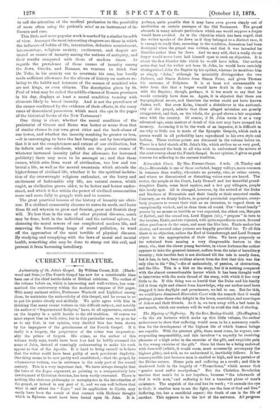CURRENT LITERATURE.
Authenticity of St. John's Gospel. By William Cmsar, D.D. (Black- wood and Sons.)—The Fourth Gospel has now for a considerable time been one of the chief battle-fields of Biblical criticism. The author of the volume before us, which is interesting and well-written, has sum- marised the controversy within the moderate compass of 260 pages. With many eminent critics, Professors Westcott and Lightfoot among them, he maintains the authenticity of this Gospel, and he seems to us to put his points clearly and skilfully. We quite agree with him in thinking that many recent writers on this difficult subject, and notably the author of "Supernatural Religion," have, to all appearance, entered on the inquiry in a spirit hostile to the old tradition. Of coarse we must expect bias on both sides, but in this particular case, we go so far as to say that, in our opinion, very decided bias has been shown by the impugners of the genuineness of the Fourth Gospel. If it really is a forgery, the perpetrator of the crime was unquestion- ably the prince of forgers. His crime, as the author of this volume truly says, would have been less had he boldly assumed the name of John, instead of cunningly endeavouring to make his work appear as that of the Apostle. It is hard to bring oneself to believe that the writer could have been guilty of such persistent duplicity. One thing seems to be now pretty well established,—that the gospel, by whomsoever written, was in existence in the early part of the second century. This is a very important fact. We have always thought that the force of the Logos argument, as pointing to a comparatively late development of Christian doctrine, has been vastly overrated. There is nothing like abstruse philosophy or metaphysics in the introduction of the gospel, or indeed in any part of it, and we can well believe that what is said about the "Logos" and its application to Christ, may easily have been the result of that contact with Hellenic thought -which in Ephesus must have been forced upon St. John. It is perhaps, quite possible that it may have even grown simply out of meditation on certain passages of the Old Testament. The gospel abounds in many minute particulars which one would suppose a forger would have avoided. As to the objection which has been urged, that the writer speaks of the Jews as if they belonged to a distinct race, it is enough to reply that, according to the tradition, Jerusalem had been destroyed when the gospel was written, and that it was intended for Gentiles rather than for Jews. And we may add, that a really clever forger would never have laid himself open to such an objection. It is about the last blunder into which be would have fallen. Our author notes that had the writer not been St. John, he would have certainly distinguished John the Baptist by his epithet, whereas he mentions him as simply "John," although he invariably distinguishes the two Judases, and Simon Zelotes from Simon Peter, and gives Thomas his surname of Didymus. It is at least not unreasonable to infer from this that a forger would have dealt in the same way with the Baptist ; though, perhaps, it is too much to say that he, would certainly have done so. Again, it is objected that there are topographical errors, and therefore the writer could not have known Judrea we]l. But even Kelm, himself a disbeliever in the authenti- city of the gospel, admits that these alleged mistakes are greatly exaggerated, and that, on the whole, the gospel shows a fair acquaint- ance with the country. Of course, if St. John wrote it at a very advanced age, some matters of detail of this sort may have escaped his memory. Assuming it to be the work of an impostor, it is difficult to see why so little use is made of the Synoptic Gospels, which such a person would in all probability have reproduced in his own style and fashion. These various points are discussed in the volume before us. There is a brief sketch of St. John's life, which strikes us as very good, We recommend the book to all who wish to understand the nature of the controversy about the Fourth Gospel. In our opinion, it gives us good reasons for adhering to the current tradition.


































 Previous page
Previous page